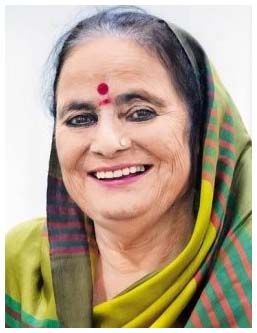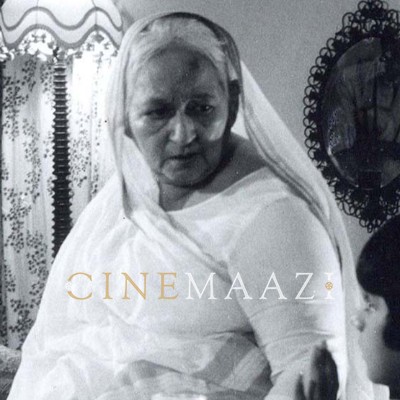Padma Sachdev

Subscribe to read full article
This section is for paid subscribers only. Our subscription is only $37/- for one full year.
You get unlimited access to all paid section and features on the website with this subscription.
Not ready for a full subscription?
You can access this article for $2 , and have it saved to your account for one year.
- Born: 17 April, 1940 (..)
- Died: 4 August, 2021 (Mumbai)
- Primary Cinema: Hindi
- Spouse: Vedpal Deep, Surinder Singh
Poet and novelist Padma Sachdev is the first modern woman poet writing in the Dogri language; she also wrote in Hindi. Winner of the Padma Shri as well as the Kabir Samman, she has several poetry collections to her credit including Meri Kavita Mere Geet, which won the Sahitya Akademi Award. Working at All India Radio, she went on to pen lyrics for films. Her works include the song Mera chhota sa ghar baar from Ved Rahi’s Prem Parbat (1973), Sona re tujhe kaise miloo rendered by Mohammed Rafi and Sulakshana Pandit and another song for Aankhin Dekhi (1978), and the songs for Saahas (1979) which she penned along with Yogesh.
She was born 17 April, 1940 in Purmandal, Jammu. The eldest of three children born to Sanskrit scholar, Professor Jai Dev Badu, her father was killed during the Partition of India in 1947. Starting her education in the primary school of her ancestral village Purmandal, situated on the banks of the sacred stream Devaka, she grew up memorising and reciting Sanskrit shlokas and Hindi couplets, later singing Dogri folk songs with local women to the accompaniment of the dholak, and composing simple verses on the pattern of Dogri folk songs.
It was while studying in her first year of college that she rose to fame as the first modern woman Dogri poet, sharing the stage with established Dogri poets at a kavi sammelan or poetry gathering. She recited a song she had composed before a distinguished audience, including the chief minister of Jammu and Kashmir state. The poem Raja Diyan Mandiyan, which she had penned at a young age, impressed by its craftsmanship, content, tone and texture, voicing the feelings of the oppressed and the exploited poor.
Recovering from a grave illness, she went on to work as a staff artist with Radio Kashmir, Jammu. She later found employment as a Dogri newsreader at All India Radio Delhi, as well as at AIR Bombay. Penning lyrics for Hindi films, she wrote the lyrics of the song Mera chhota sa ghar baar from Ved Rahi’s 1973 Hindi film Prem Parbat, which had music by Jaidev. She also wrote the lyrics of two songs for the Hindi film Aankhin Dekhi (1978), which had music by J P Kaushik. It included the famous duet Sona re, tujhe kaise miloo sung by Mohammed Rafi and Sulakshana Pandit. Along with Yogesh, she also penned the lyrics of the songs for Hindi film Saahas (1979).
Padma Sachdev’s literary works include Meri Kavita Mere Geet (1969), Tavi Te Chanhan (Rivers Tawi and Chenab, 1976), Nheriyan Galiyan (Dark Lanes, 1982), Pota Pota Nimbal (Fingertipful Cloudless Sky, 1987), Uttar Vahini (1992), Tainthian (1997), interviews Amrai and Diwankhana, and memoirs Chitt Chete.
Besides the Padma Shri Award (2001), Sahitya Akademi Award (1971), and Kabir Samman for poetry (2007-08), Sachdev was also honoured with the Dinu Bhai Pant Life Time Achievement Award (2017), Krutitava Smagra Samman (2015), and Saraswati Samman (2015) for her autobiography Chitt Chete penned in the Dogri language
On the personal front, Sachdev fell in love with and married noted Dogri poet Vedpal Deep, against the wishes of their respective families. He was 12 years her senior, and she just 16. Later, she was separated from her husband. This alienated her from the conservative middle-class society of Jammu and she lost her job at AIR Jammu, leaving her with no option but to seek employment in Delhi. In due course, she met singer Surinder Singh, Hindustani vocalist of the Singh Bandhu musical duo, who was a duty officer at the time. They married in 1966.
Padma Sachdev passed away on 4 August, 2021. She was 81.
Additional secretary of J&K Academy of Art, Culture and Languages Arvinder Singh Aman chaired a condolence meeting for Sachdev. Rich tributes were paid to the "doyen of Dogri literature". Said Aman, “Sachdev's contribution to the Dogri language is exemplary. She was a living example of Dogri culture." He added that she would be remembered for giving her mother tongue global recognition as her lyrics sung by famous Hindi film industry singers made Dogri popular not only in India but around the world. He said Sachdev's passing was an irreparable loss for Jammu, and she would also be remembered for her key role in the struggle for getting Dogri added to the Eighth Schedule of the Constitution.








.jpg)



